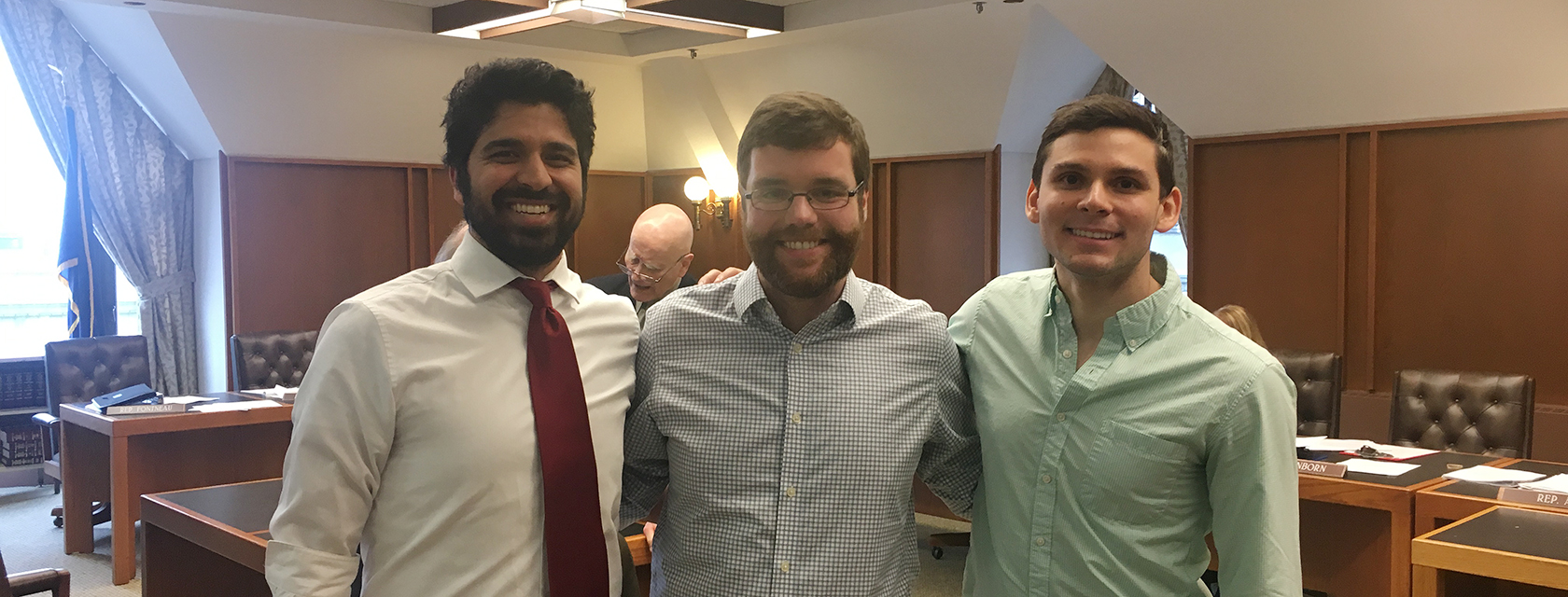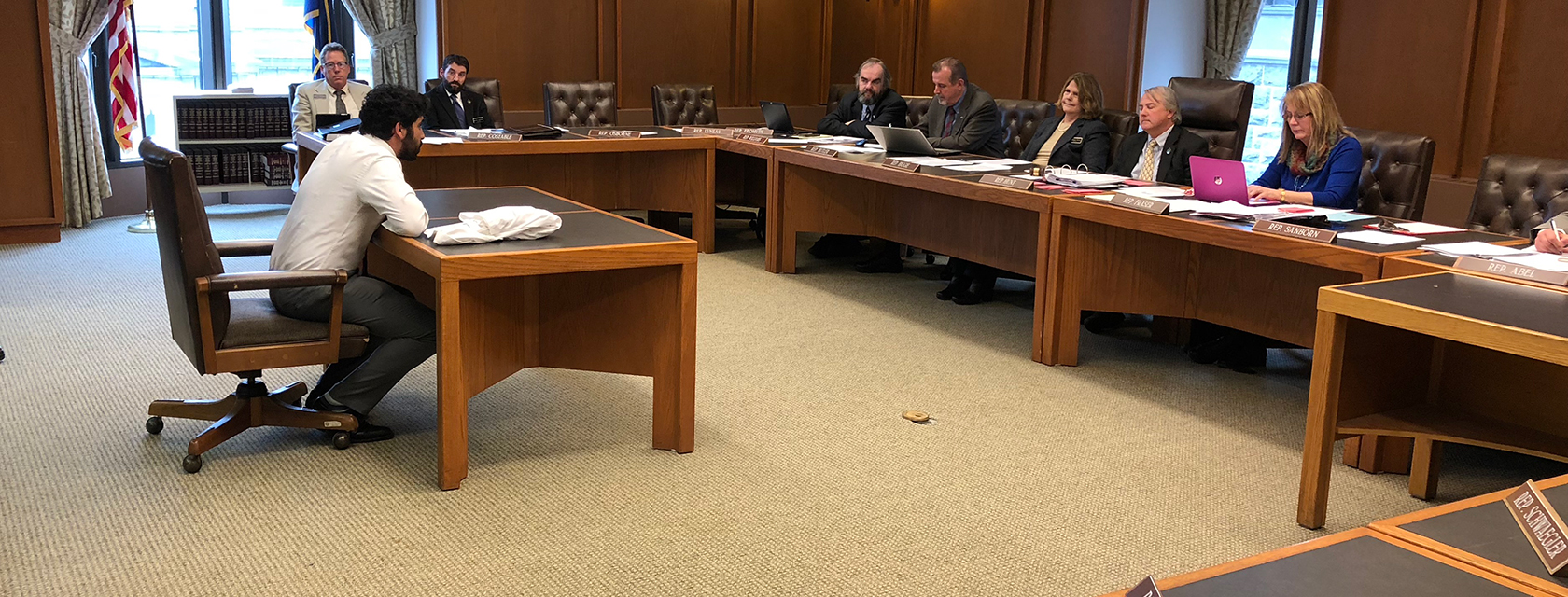
Three Geisel School of Medicine students testified at a New Hampshire state legislature hearing in Concord last week on behalf of one of four House bills that could result in a single payer, state-run healthcare system.
The large crowd of supporters, including physicians and medical students, joined Democratic representatives in advocating for the change.
Reza Hessabi ’20, who has worked in politics and has been active in political advocacy, says legislators are not experts in everything they legislate on and they don’t need to be. “I’ve learned the value of having physicians and physicians-in-training speak on the topics of healthcare. By testifying, I was able to impress upon them the importance of a legacy of making good decisions that I, as a future doctor, could use to practice medicine better—I encouraged them to not make the lazy choice of perpetuating a broken system through their inaction and indifference.”
Hessabi, along with David Lakomy ’20, Sarah Rosenstein ‘20, and Alex Doering ’20 are all members of Geisel’s Student Chapter of Physicians for a National Health Program (SNaHP) and have been working closely with the organization’s New Hampshire chapter.
Rosenstein and Lakomy founded the medical school’s chapter in 2016 after Rosenstein met Donald Kollisch, MD, an associate professor of medicine and of community and family medicine at Geisel. An advocate for single payer healthcare and a convener of the Granite State Chapter of Physicians for a National Health Program (NH-PNHP), he became Rosenstein’s mentor. “Dr. Kollisch encouraged me to get involved with the healthcare debate,” says Rosenstein. “It seemed natural that my next step should be to found a student chapter, and I did just that with my fellow classmate David Lakomy.”
Lakomy says he was impressed and inspired by all of the student activism at Geisel but felt, along with Rosenstein, that health policy wasn’t getting much attention. “Health policy drives the whole system—in the early part of 2017 when congress made its first attempt to dismantle the ACA, we found it imperative to try to rally students against the attempt, and from there the group really began.”
SNaHP is committed to education and advocacy. They have held several educational events at Geisel and members have attended the national SNaHP Summit to better educate themselves about single payer advocacy.
Kollish, SNaHP’s faculty adviser, says Geisel students have for many years been interested in social justice in healthcare, and some have focused on single payer (also referred to as improved Medicare for all) or other mechanisms for achieving Universal Healthcare. “They have long thought of healthcare as a right, rather than a privilege. Some of the students have attended our NH-PNHP meetings and attended our rallies,” he notes. “But it was Sarah and David who recognized that institutions and groups can be the key to sustainability. So they did the hard work to develop a student chapter.”

Along with their parent organization, NH-PNHP, SNaHP is intimately involved in New Hampshire state politics and has developed a rapid response team of medical students ready to attend political hearings or demonstrations. The team jumped into action last week when Lakomy, Hessabi, and Doering testified for HB1241, a proposal to study the feasibility of a single payer healthcare system in New Hampshire.
NH-PNHP has been advocating for statewide single-payer legislation for some time, Lakomy says, “and now that it was up for an initial vote in the commerce committee, we found it crucial to make our voice known—to explain how we are the future of this field and how we cannot stand any further for the inefficiency, inequality, and injustice that is riddled in our healthcare system.”
Rosenstein say Geisel teaches medical students how to determine the best treatment for their patients, but the current healthcare system creates challenges. “There are many social determinants of health that we cannot fix as physicians—education, poverty, food access. Though we can eliminate one: lack of health coverage.
“My classmates and I came to medical school because we wanted to solve difficult problems and help our patients live better, longer lives,” she says. “A single, publicly funded, privately and universally delivered healthcare system is the only way for us to realize these goals.”
Believing healthcare is a basic human right, Geisel SNaHP is committed to advocating that all people regardless of age, gender, race, ethnicity, sexual orientation, religion, ability, or socioeconomic class are able to access healthcare.
Of the students’ testimonies, Kollisch says, “They spoke about quality of care, fairness, and their desire to inherent a functional healthcare system when they graduate—most dramatically, one of the students said (and I paraphrase) to the Committee members, ‘We will be the doctors who will be taking care of your children and grandchildren. We want to be able to take care of them and EVERYONE’s grandchildren in a system that works!
“I am very proud of these students and proud of the role that Geisel plays in supporting students working to make healthcare better.”